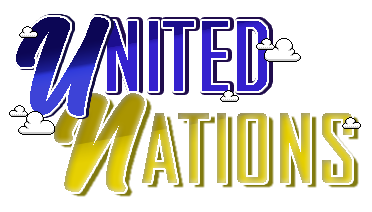Many of you work in UN but did you know UN is a real organigation helping to create a better world for us.
Yeah,today I MEAN TODAY-NOW I AM GONNA TALK ABOUT IT
First-The logo
UN's real logo is different from us,it is more sofisticated from ours.It reminds us that the world is round????!!!!!
yeah,how dare to teach that the earth is round,yeah,so to break your hearth the earth is ROUND????!!!!!!
yeah,don't believe me see this this link that say earth is round http://crosstalk.cell.com/blog/seven-ways-to-prove-earth-is-round and here's the logo of UN[IRL] http://www.un.org/sites/www.un.org/themes/bootstrap_un/logo.png
SECOND-THE WORK
The United Nations (UN) is anintergovernmental organization tasked to maintain international peace and security, develop friendly relations among nations, achieve international co-operation and be a centre for harmonizing the actions of nations.[3]A replacement for the ineffective League of Nations, the organization was established on 24 October 1945 after World War II with the aim of preventing another such conflict. At its founding, the UN had 51 member states; there are now 193. The headquarters of the UN is inManhattan, New York City, and is subject toextraterritoriality. Further main offices are situated in Geneva, Nairobi, and Vienna. The organization is financed by assessed and voluntary contributions from its member states. Its objectives include maintaining international peace and security, protecting human rights, delivering humanitarian aid, promoting sustainable development and upholding international law. [4] The UN is the largest, most familiar, most internationally represented and most powerful intergovernmental organization in the world.[5]
In 25 April 1945, 50 governments met in San Francisco for a conference and started drafting the UN Charter and was adopted on 25 June 1945 in the San Francisco Opera House, and was signed on 26 June 1945 in the Herbst Theatre auditorium in the Veterans War Memorial Building. This charter took effect on 24 October 1945, and the UN began operation.
The UN's mission to preserve world peace was complicated in its early decades during the Cold War between the United States and Soviet Unionand their respective allies as the two nations frequently paralyzed the Security Council. Thus, peacekeeping was limited to maintaining ceasefires and stabilizing situations on the ground, providing crucial support for political efforts to resolve conflict by peaceful means. Those missions consisted of unarmed military observers and lightly armed troops with primarily monitoring, reporting and confidence-building roles.[6] The organization participated in the Korean War by helping South Korea repel invasion from North Korea in 27 June 1950 and signed the Korean Armistice Agreement in 27 July 1953.[7] The UN also established a peacekeeping force named ONUC on 14 July 1960 to help the DR Congo to become stable during the Congo Crisis from 15 July 1960 to 11 May 1964. The UN also passed a resolution calling Palestine to be split between the Arabs and the Jews in November 29, 1947, which then led to the creation of Israel, formed by the Jews on May 14, 1948.[8] The organization's membership grew significantly following widespread decolonization which started in the 1960s. Since then, 80 former colonies had gained independence, including 11 trust territories, which were monitored by the Trusteeship Council(inactive since 1 November 1994).[9] By the 1970s its budget for economic and social development programmes far outstripped its spending onpeacekeeping. After the end of the Cold War, the UN shifted and expanded its field operations which involves more peacekeeping missions and undertaking a wide variety of complex tasks.[10]
The UN has six principal organs: the General Assembly (the main deliberative assembly); theSecurity Council (for deciding certain resolutions for peace and security); the Economic and Social Council (ECOSOC; for promoting international economic and social co-operation and development); the Trusteeship Council (inactive since 1 November 1994); the International Court of Justice (the primary judicial organ); and the UN Secretariat (for providing studies, information, and facilities needed by the UN). The UN System agencies include the World Bank Group, the World Health Organization, the World Food Programme, UNESCO, andUNICEF. The UN's most prominent officer is the Secretary-General, an office held by Portuguese politician and diplomat António Guterres since 1 January 2017. Non-governmental organizations may be granted consultative status with ECOSOC and other agencies to participate in the UN's work.
The organization, its officers and its agencies had also won many Nobel Peace Prizes. In 1950, a UN Mediator, Ralph Bunche, received the prize for his work as mediator in thePalestinian conflict. In 1954 and 1981, a UN agency, UNHCR, has been awarded the prize. In 1961, a former Secretary-General, Dag Hammarskjöld, has been awarded this prize after his death. In 1965, another agency, UNICEF, had received the prize. In 1969, another agency,ILO, received it since it has done most to promote fraternity among nations by ensuring social justice. In 1988, the UN peacekeeping forces had been awarded the prize for reducing tensions between nations. In 2001, UN and a former Secretary-General, Kofi Annan, received the prize for their work for a better organized and peaceful world. In 2005, another agency,IAEA and a former director, Mohamed ElBaradei, had received their prize "for their efforts to prevent nuclear energy from being used for military purposes and to ensure that nuclear energy for peaceful purposes is used in the safest possible way".[11] In 2007, IPCC and Al Gore Jr had received the prize "for their efforts to build up and disseminate greater knowledge about man-made climate change, and to lay the foundations for the measures that are needed to counteract such change."[12] And currently, another agency, OPCW, received the prize in 2013 "for its extensive efforts to eliminate chemical weapons".[13]
Other evaluations of the UN's effectiveness have been mixed. Some commentators believe the organization to be an important force for peace and human development, while others have called the organization ineffective, corrupt, or biased.
YEAH,I TOOK THAT FROM WIKIPEDIA-DON'T JUDGE
TL:DR: UN WORKS FOR POVERTY,WOMAN RIGHT,HUNGER,ETC YOU GET THE POINT
IT IS GETTING A BIT LONG SO I'LL COVER THE OTHER TOPICS OF UN IN THE NEXT PART I GUESS.

